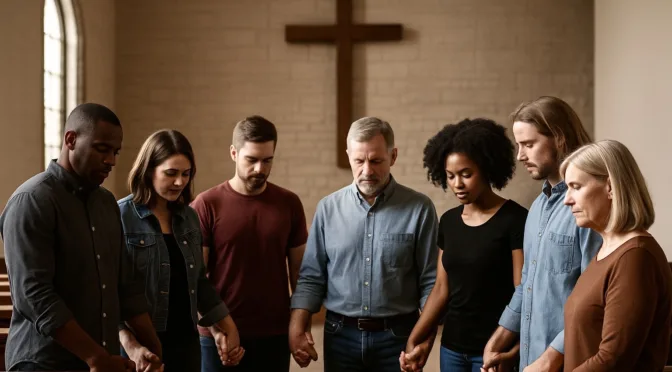Intercessory Travail
Unlocking the Mystery: The Four Kinds of Tongues in the Bible – Part 4
There are moments in the life of a believer when words fail, and prayer moves beyond language into the realm of deep spiritual groanings. This is not the formal tongues spoken in public, nor even the personal prayer language; it is Spirit-led intercession so profound that it cannot be expressed in human speech.
“In the same way the Spirit also helps our weakness; for we do not know what to pray for as we should, but the Spirit Himself intercedes for us with groanings too deep for words.” (Romans 8:26, NASB)
These are the times when the Holy Spirit prays through us — birthing, warring, and interceding for the will of God to be done on earth as it is in heaven.
What Are Deep Spiritual Groanings?
Unlike other kinds of tongues where structured speech is given, deep spiritual groanings are the sighs, cries, and wordless utterances born from the deepest part of the soul. The believer’s spirit, under the influence of the Holy Spirit, utters what the mind cannot conceive.
Paul describes it as a kind of divine burden:
“For we know that the whole creation groans and suffers the pains of childbirth together until now.” (Romans 8:22, NASB)
Just as creation groans for redemption, so believers sometimes enter into deep spiritual travail — groaning with God’s Spirit for breakthrough, for nations, for revival, or for the salvation of souls.
Why Deep Spiritual Groanings Matter
These moments are not simply emotional experiences; they are spiritual transactions. In these times:
- The Holy Spirit aligns our prayers with the perfect will of God.
- Intercession becomes deeper and more effective, bypassing human limitations.
- Spiritual breakthroughs are birthed unseen, but felt powerfully.
When we are too weak, too burdened, or too confused to know how to pray, the Spirit steps in — carrying our prayer life beyond what our minds can comprehend.
Travail for Revival
In the late 20th century, before a major revival broke out in Brownsville, Florida, a small group of intercessors gathered weekly. During those gatherings, prayer often moved beyond words. People groaned and cried out under the weight of a burden they couldn’t articulate. Shortly after, a wave of revival swept through their church, impacting thousands with salvation and restoration — a visible answer to the invisible groanings of the Spirit.
The Labor Pains of New Birth
Paul compares the work of prayer to childbirth:
“My children, with whom I am again in labor until Christ is formed in you.” (Galatians 4:19, NASB)
Labor is intense, exhausting, and filled with groanings. But labor results in new life. So it is with deep spiritual groanings — they are the labor pains of birthing God’s purposes into reality.
Self-Examination Questions
- Have I invited the Holy Spirit to lead me beyond my own understanding in prayer?
- Do I press deeper when prayer becomes difficult, trusting the Spirit to intercede through me?
- Am I willing to carry burdens in prayer until breakthrough comes?

Groanings Too Deep for Words
Deep spiritual groanings are not signs of weakness; they are evidence of the Spirit’s strength working through us. In these moments, the believer touches the heart of God, interceding not with eloquence, but with the raw, Spirit-born language of heaven.
“He who searches the hearts knows what the mind of the Spirit is, because He intercedes for the saints according to the will of God.” (Romans 8:27, NASB)
Yield to these groanings. Trust that God hears them. They are powerful, effective, and they move heaven and earth.
Prayer
Holy Spirit, thank You for helping us when we are weak. Teach us to trust You when words fail and to surrender to the deep groanings You birth within us. Let our prayers align with God’s perfect will. Move through us to bring revival, healing, and salvation to the earth. In Yeshua’s name we pray, amen.
⸻
See Also
- Labor for God with All Your Might
- Healing for the Body, Peace for the Soul
- The Birth of Jesus
- Enduring Suffering with Faith: A Scriptural Guide to Finding Hope in God
- Trusting God in the Trial
Kept reading eh?
“Groanings Too Deep for Words”
Lyrics:
[Verse 1]
When words fall silent, and my heart can’t speak,
Your Spirit prays for me, when I am weak.
Groanings rise like rivers unseen,
You carry my soul where I’ve never been.
[Pre-Chorus]
In the stillness, You are near,
Breaking through every doubt and fear.
[Chorus]
Groanings too deep for words,
Spirit, You move in the unseen surge.
Heaven and earth align,
In the soundless cry that touches the divine.
[Verse 2]
You intercede with holy fire,
Breathing life to my silent desire.
When my strength is gone and hope feels blurred,
You speak for me in groanings unheard.
[Pre-Chorus]
In the stillness, You are near,
Breaking through every doubt and fear.
[Chorus]
Groanings too deep for words,
Spirit, You move in the unseen surge.
Heaven and earth align,
In the soundless cry that touches the divine.
[Bridge]
Birth in me what eyes can’t see,
Move in power, set captives free.
Groanings rise, the battle turns,
As heaven bends to Spirit yearns.
[Chorus]
Groanings too deep for words,
Spirit, You move in the unseen surge.
Heaven and earth align,
In the soundless cry that touches the divine.
[Outro]
Groanings too deep… too deep for words,
Spirit, speak what can’t be heard.














